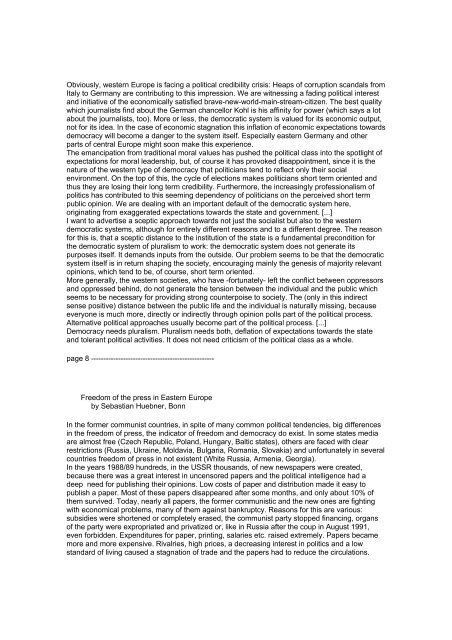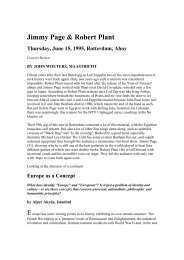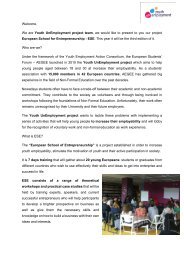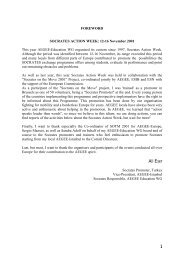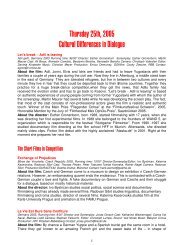OneEurope 1/93 East-West Magazine HOW TO BUILD THE ...
OneEurope 1/93 East-West Magazine HOW TO BUILD THE ...
OneEurope 1/93 East-West Magazine HOW TO BUILD THE ...
Create successful ePaper yourself
Turn your PDF publications into a flip-book with our unique Google optimized e-Paper software.
Obviously, western Europe is facing a political credibility crisis: Heaps of corruption scandals from<br />
Italy to Germany are contributing to this impression. We are witnessing a fading political interest<br />
and initiative of the economically satisfied brave-new-world-main-stream-citizen. The best quality<br />
which journalists find about the German chancellor Kohl is his affinity for power (which says a lot<br />
about the journalists, too). More or less, the democratic system is valued for its economic output,<br />
not for its idea. In the case of economic stagnation this inflation of economic expectations towards<br />
democracy will become a danger to the system itself. Especially eastern Germany and other<br />
parts of central Europe might soon make this experience.<br />
The emancipation from traditional moral values has pushed the political class into the spotlight of<br />
expectations for moral leadership, but, of course it has provoked disappointment, since it is the<br />
nature of the western type of democracy that politicians tend to reflect only their social<br />
environment. On the top of this, the cycle of elections makes politicians short term oriented and<br />
thus they are losing their long term credibility. Furthermore, the increasingly professionalism of<br />
politics has contributed to this seeming dependency of politicians on the perceived short term<br />
public opinion. We are dealing with an important default of the democratic system here,<br />
originating from exaggerated expectations towards the state and government. [...]<br />
I want to advertise a sceptic approach towards not just the socialist but also to the western<br />
democratic systems, although for entirely different reasons and to a different degree. The reason<br />
for this is, that a sceptic distance to the institution of the state is a fundamental precondition for<br />
the democratic system of pluralism to work: the democratic system does not generate its<br />
purposes itself. It demands inputs from the outside. Our problem seems to be that the democratic<br />
system itself is in return shaping the society, encouraging mainly the genesis of majority relevant<br />
opinions, which tend to be, of course, short term oriented.<br />
More generally, the western societies, who have -fortunately- left the conflict between oppressors<br />
and oppressed behind, do not generate the tension between the individual and the public which<br />
seems to be necessary for providing strong counterpoise to society. The (only in this indirect<br />
sense positive) distance between the public life and the individual is naturally missing, because<br />
everyone is much more, directly or indirectly through opinion polls part of the political process.<br />
Alternative political approaches usually become part of the political process. [...]<br />
Democracy needs pluralism. Pluralism needs both, deflation of expectations towards the state<br />
and tolerant political activities. It does not need criticism of the political class as a whole.<br />
page 8 --------------------------------------------------<br />
Freedom of the press in <strong>East</strong>ern Europe<br />
by Sebastian Huebner, Bonn<br />
In the former communist countries, in spite of many common political tendencies, big differences<br />
in the freedom of press, the indicator of freedom and democracy do exist. In some states media<br />
are almost free (Czech Republic, Poland, Hungary, Baltic states), others are faced with clear<br />
restrictions (Russia, Ukraine, Moldavia, Bulgaria, Romania, Slovakia) and unfortunately in several<br />
countries freedom of press in not existent (White Russia, Armenia, Georgia).<br />
In the years 1988/89 hundreds, in the USSR thousands, of new newspapers were created,<br />
because there was a great interest in uncensored papers and the political intelligence had a<br />
deep need for publishing their opinions. Low costs of paper and distribution made it easy to<br />
publish a paper. Most of these papers disappeared after some months, and only about 10% of<br />
them survived. Today, nearly all papers, the former communistic and the new ones are fighting<br />
with economical problems, many of them against bankruptcy. Reasons for this are various:<br />
subsidies were shortened or completely erased, the communist party stopped financing, organs<br />
of the party were expropriated and privatized or, like in Russia after the coup in August 1991,<br />
even forbidden. Expenditures for paper, printing, salaries etc. raised extremely. Papers became<br />
more and more expensive. Rivalries, high prices, a decreasing interest in politics and a low<br />
standard of living caused a stagnation of trade and the papers had to reduce the circulations.


